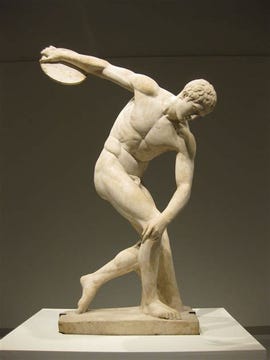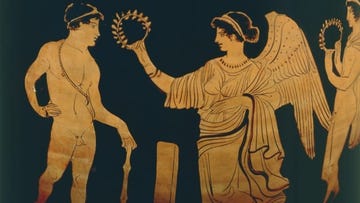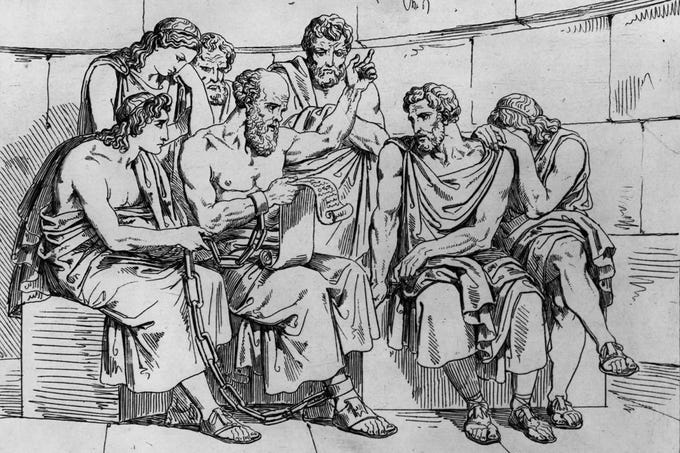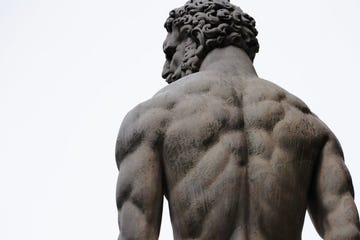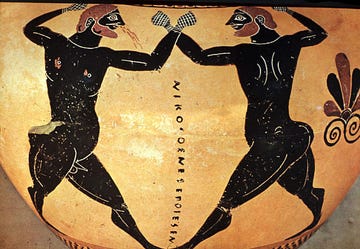The titans of ancient Greek philosophy wanted you to get jacked and strong
3 Ways to Apply the Lessons of Socrates, Plato, and Aristotle for modern health
The greatest philosophers of Ancient Greece, Socrates, Plato, and Aristotle teach us how to live an embodied life on meaning in the modern world.
What is embodiment?
It's the idea that body and mind are one entity that drive towards a moral excellence. It's found in cultures throughout the world
But the Ancient Greeks took it a step further
They created competitive sports as an activity to emphasize embodiment. For them sport best represented the unity of body, mind, and spirit.
It was the place for individuals to reach towards their best potential. Competition bred excellence and displayed sacrifice and struggle. Athletes were said to 'touch the fingertips of the gods' when they won.
It's no surprise that athletic ideals found their way into philosophy. The Ancient Olympics had been around almost 400 years by the time Socrates began asking questions.
The Philosophers and Sport
So how do the three most famous ancient philosophers teach us about embodiment?
We can mine their wisdom to learn about the importance of our bodies and why sport aligns us to our greatest potential.
1. Socrates - Dialogue
Socrates is famous for giving us the 'Socratic Method.'
It's the use of a back and forth exchange to discover the truth about things.
This is the element of competition in sport: An exchange between competitors.
A wrestling match is a great example and it's no surprise that Socrates was a wrestler.
When we use our bodies to go back and forth in competition we ignite our minds and spirits. We use the brain to strategize and outwit our opponent. We use our spirit to fight through resistance, pain, and suffering
2. Plato - Beauty
Plato famously believed the body and soul to be separate. But we can still take from his philosophy to understand embodiment. Plato longed to define and appreciate beauty
The athletic male body best exemplified beauty. It expressed the time, dedication, and excellence of athletic pursuit.
But beauty helps us understand the meaning of motion. Sports speak to our souls because we love to feel certain motions You feel alive when running fast, lifting heavy, or engaging an opponent.
Without an artistic appreciation for sport and exercise they become robotic and monotonous The beauty of bodies in motion lights our eyes on fire with passion
3. Aristotle - Virtue
Aristotle cared about how you acted consistently, day to day, week to week, year to year. Those consistent behaviors are your character and the positive ones known as virtues
Sport develops virtue by aiming us towards our passion and forcing us to struggle to achieve them. When you play sport for the love of the game they become moral spaces.
Your body becomes the vehicle to display the passion of the soul and the development of the mind. But only if you approach it with the correct intentions and give it everything you've got.
How to apply in the modern day?
So how can YOU apply these lessons from these philosophical lessons? How can you become embodied?
There are 3 important ways:
1. Sport isn't superficial
When you engage in sport, exercise, or physical competition you are engaging in deep work. It's not just working the body
Next time you're about to use your body stop and use you mind to understand the richness of the experience.
Ask yourself "why is this so important to me?"
Probe a little deeper than normal and a world of depth will open up for you.
2. Sport requires balance
Think of the relationship between 'dialogue - beauty - virtue'
Too much competition and not enough meaning sours sport. You can build your character in sport but if you don't compete you aren't showcasing yourself.
Embodiment tells us to balance mind and body. You need to balance training for results, training for fun, and competing to get the full benefits of physical activity.
3. Sport requires passion
If you don't LOVE what you are doing you won't stick with it. And you won't get the full value of it
There's the utility of sport but embodiment speaks to our souls.
Socrates chose death to preserve truth.
Plato aspired to understand and free the soul.
Aristotle lights our soul on fire by telling us to chase our passions.
If you neglect the meaning of your movement you'll be left with just numbers and measurements.
You MUST move in a way that sparks your soul.
Otherwise you're not living to your true potential.




